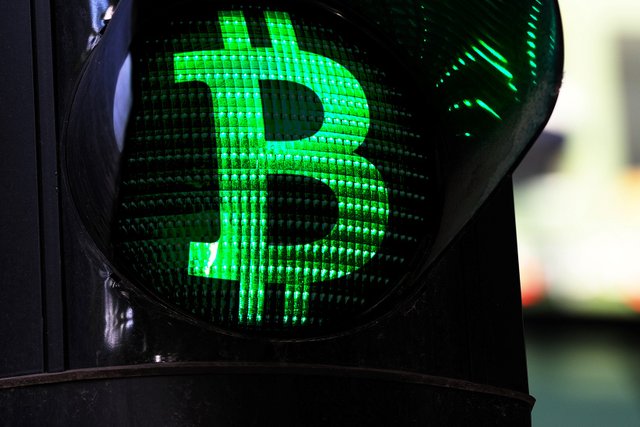Why Regulators Will Give Crypto a Green Light
HELLO FRIENDS ,

sorce
The naysayers keep telling us that cryptocurrencies can't possibly work … that they fly in the face of existing laws and regulations in the world's dominant financial centers.
"Cryptos are contrary to central bank policies," they rave. "These kids are selling unregistered securities to unqualified investors!" they rant.
Take the case of the U.S., for example.
The CFTC, the agency in charge of regulating commodity futures markets, claimed that cryptocurrencies should be viewed as commodities …
The SEC, in charge of regulating securities markets, claimed many cryptocurrencies are securities offerings ...
And the U.S. Treasury Department seemed inclined to label all cryptos as "money." Guess what they're in charge of regulating?
Hah! It all sounds eerily similar to the early days of the automobile in 19th-century Britain.
Nearly all roadways were dirt roads — good for horses and carriages, bad for the nascent technology of self-propelled vehicles.
But instead of recognizing that the old roads were unsuitable, the authorities rushed to concoct laws that treated the new vehicles as unsuitable.
The "Locomotive Act of 1865" imposed speed limits of 4 mph in the country and 2 mph in the city. It required vehicles hauling wagons to be preceded by a man on foot waving a red flag and blowing a horn.
All designed to protect folks from "that horrible, devilish machine"!
And all for naught:
The laws temporarily halted most R&D for the new technology in Britain … gave the United States a chance to take the lead … and later forced Britain to reverse the innovation-stifling rules with new legislation like the "Motor Car Act of 1903."
The British government had no choice. Otherwise they'd be left out in the cold.
In sum …
A new technology was introduced.
It was deemed too disruptive to society, prompting regulators to rein it in.
None of this stops innovation. Quite to the contrary, what actually happens is that …
Innovation drives regulation. Not the other way around! Sounds familiar?
It should. Because when it comes to cryptocurrencies and their Distributed Ledger Technology (DLT), we're witnessing a similar sequence of events.
The SEC's decision to exempt Ethereum from securities regulations is a big deal: it will encourage crypto market liquidity and lead to more price stability.
Plus, there's another, even bigger reason this development is important.
To understand how, go back to 2017: The so-called "experts" in Washington and on Wall Street assumed the boom in Initial Coin Offerings (ICOs) was just a bubble. And I spoke with some smart investors who agreed.
"It's just a fad," they argued. "Since ICOs are like unregistered securities, the regulators will surely come down on 'em hard! They'll wipe out the ICOs. Worse, they'll smash technologies like Ethereum that make the ICOs possible. Soon it'll all be history."
Without a historical perspective on the evolution of technology, this argument actually made some sense:
Ethereum enabled the sale of ICOs, which are, in effect, unregistered securities.
The Ethereum team marketed their product heavily, including to U.S. citizens.
They offered a token for a future platform that was yet to be developed.
People who participated in the Ethereum offering were unabashedly deemed "investors."
And the investors who bought ICOs did so largely with the expectation of turning a profit — not to take advantage of Ether's so-called "utility value."
All seemingly valid reasons for the SEC to allege the sale of unregistered securities … force exchanges to de-list Ethereum … and try to bring it to its knees, right?
Maybe. But then something strange (or not-so-strange!) happened:
Innovation Drove Regulation
Wall Street started getting involved.
Large venture capital firms began investing in the technology.
Big names in finance drew up plans to launch their own projects based on Ethereum's technological innovation.
More big money started moving in.
And all of a sudden, U.S. regulators found themselves in a tricky spot:
• They could play it by the book, call a spade a spade, label Ethereum an unregistered security and haul its founders into criminal court.
Or …
• They could recognize the technology's powerful potential contribution to financial markets and let innovation lead regulation.
Their USD 64,000 question was: Do we crack down with a shotgun approach, and watch the likes of China and Russia become the leaders in DLT?
Or do we back off, let the industry find its footing, and just target individual cases with a clear intent to commit fraud?
The fact that they've chosen the latter was a landmark event. It was a tacit recognition that …
• No regulation could have halted the forward march of this technological evolution.
• Instead, as we saw with the auto industry in 19th-century Britain, it would have merely driven the innovators (and the capital) to friendlier jurisdictions.
• Moreover, since Ethereum is a de facto decentralized open platform, it would have been even more difficult to contain than any 19th-century technology.
Again, the big takeaway is: Innovation drives regulation; not the other way around.
More Mainstream Acceptance on the Way
Big nations are just beginning to recognize the transformational potential of DLT for the society of the future. And like investors, government officials have a great fear of missing out.
So next time you think DLT is going to be slowed down by draconian regulations, here's what to do:
First, remember this Ethereum story and how it ended.
Second, look back at virtually every major innovation of the past 200 years.
Then ask yourself: Were those new technologies ever "compliant" with existing regulatory frameworks? And did any such lack of compliance stop their advance for long?
Sure, some countries will try to buck the trend sometimes. But …
It won't be DLT that suffers the consequences of stifling regulations. It will be the country that imposes them.
Meanwhile, in most countries most of the time, expect more free passes and more green lights, clearing a path for DLT to take the next leaps forward

Indeed. ethereum is one of my favourite cryptocurrencies less for the monetary value and more for its utility value, to be honest. Sure, I purchase it every week, but I use it more for distributed applications than I do for purely monetary purposes. I think that once tokens are recognized as more than just money, that will definitely help.
It will have to be regulated for sure.